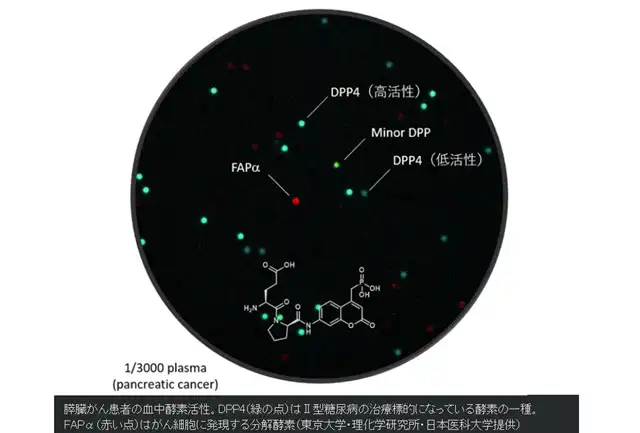New Test Method Detects Early Pancreatic Cancer Through Blood Enzyme Activity
- Normal Liver Cells Found to Promote Cancer Metastasis to the Liver
- Nearly 80% Complete Remission: Breakthrough in ADC Anti-Tumor Treatment
- Vaccination Against Common Diseases May Prevent Dementia!
- New Alzheimer’s Disease (AD) Diagnosis and Staging Criteria
- Breakthrough in Alzheimer’s Disease: New Nasal Spray Halts Cognitive Decline by Targeting Toxic Protein
- Can the Tap Water at the Paris Olympics be Drunk Directly?
New Test Method Detects Early Pancreatic Cancer Through Blood Enzyme Activity
- Should China be held legally responsible for the US’s $18 trillion COVID losses?
- CT Radiation Exposure Linked to Blood Cancer in Children and Adolescents
- FDA has mandated a top-level black box warning for all marketed CAR-T therapies
- Can people with high blood pressure eat peanuts?
- What is the difference between dopamine and dobutamine?
- How long can the patient live after heart stent surgery?
New Test Method Detects Early Pancreatic Cancer Through Blood Enzyme Activity
Early pancreatic cancer discovered through abnormal enzyme activity in blood: University of Tokyo develops test method.
A collaborative research group including the University of Tokyo has announced the development of a test method to detect abnormal enzyme activity in the blood of relatively early-stage pancreatic cancer patients.
Pancreatic cancer is a representative “intractable cancer” that is often detected late and is often advanced by the time it is found.
The results are expected to lead to the practical application of a new pancreatic cancer diagnostic method that is highly accurate and can detect early stages.

There are thousands of enzymes in the body, and the group of proteins that make up enzymes play an important role in maintaining the environment from outside the body and changes inside the body. Abnormalities in enzyme activity occur in relation to the onset of various diseases, and this phenomenon is already being used as a biomarker to determine the presence or absence of disease. However, it has been difficult to detect enzymes that are present in very small amounts in the blood using previous methods.
The research group, including Associate Professor Tetsuro Komatsu and Professor Taisho Urano of the Graduate School of Pharmaceutical Sciences at the University of Tokyo, Senior Researcher Rikiya Watanabe of the RIKEN Center for Sustainable Resource Science, and Professor Kazufumi Honda of the Graduate School of Medicine at Nippon Medical School, had previously developed a method to distinguish and detect various enzymes present in very small amounts in the blood at the “single molecule level.” The combination of a technique called “organic small molecule fluorescence probe technology,” which detects enzyme activity with high sensitivity, and “microchip technology,” which enables high-precision measurement at the single molecule level, was a feature of their work.
Using the developed “single molecule enzyme activity measurement technology,” Associate Professor Komatsu and his colleagues examined the abnormal enzyme activity in the blood of relatively early-stage “stage I to II” pancreatic cancer patients. As a result, they found that the activity of enzymes such as DPP4, elastase, and CD13 was significantly different from that of healthy individuals, indicating that abnormalities were occurring.
DPP4 is a type of enzyme that is also a therapeutic target for type II diabetes. Elastase is produced in the pancreas and white blood cells and has the role of hydrolyzing a substance called elastin outside the cells. CD13 is known to increase the blood vessels of cancer. These enzymes are present in only small amounts in the blood and could not be detected using conventional methods called “spectroscopic methods,” which analyze enzymes as a population of molecules ranging from 1 million to 1 billion, according to the researchers.
The “cancer 5-year survival rate” announced by the National Cancer Center in March last year (the survival rate 5 years after diagnosis in 2014-15) was 66.2% for all cancers, but only 12.7% for pancreatic cancer, which was prominently low along with small cell lung cancer at 11.5%. According to “cancer statistics,” there were a total of 43,865 people diagnosed with pancreatic cancer in 2019, with 37,677 deaths in 2020. The government’s “Fourth Cancer Control Promotion Basic Plan,” which was approved by the Cabinet in March last year, also prioritizes measures against intractable cancers such as pancreatic cancer.
The research group led by Associate Professor Komatsu stated, “Until now, early diagnosis of pancreatic cancer has been difficult, and the development of biomarkers that can be detected early has been awaited. The test method developed this time has led to the discovery of biomarker candidates that can reflect changes in the condition of pancreatic cancer,” and they plan to continue efforts toward practical application. The research results were published online in the scientific journal Cell Reports Methods on January 12.
New Test Method Detects Early Pancreatic Cancer Through Blood Enzyme Activity
References:
https://news.yahoo.co.jp/articles/3f7da80eea20930bd660271695baf4644d406824
(source:internet, reference only)
Disclaimer of medicaltrend.org
Important Note: The information provided is for informational purposes only and should not be considered as medical advice.



